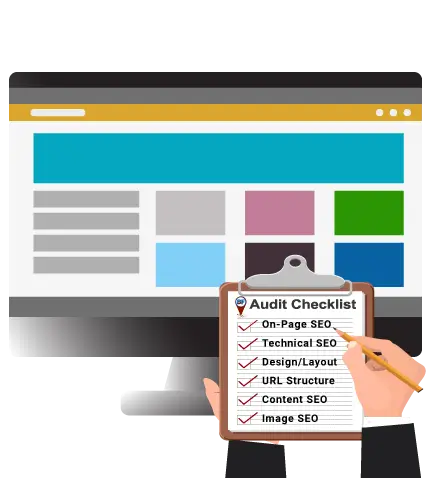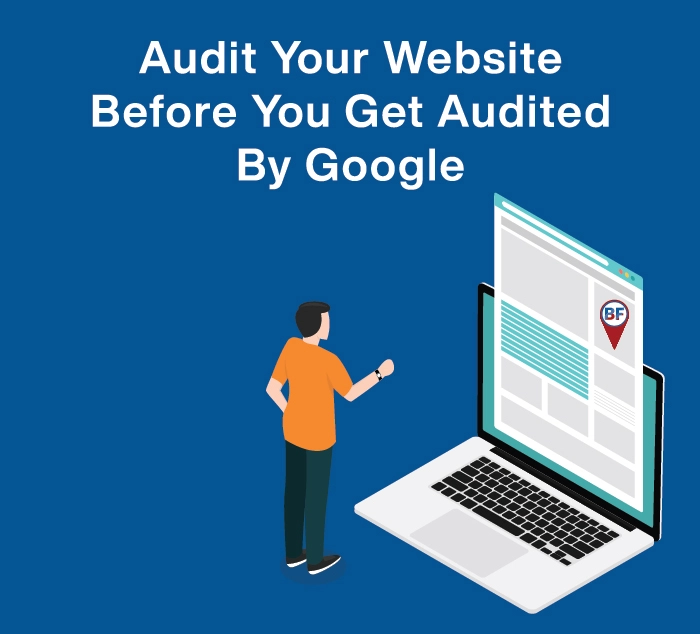SEO audit services
Find The SEO Issues Preventing Your Website From Outranking The Competition

GET A COMPLETE WEBSITE AUDIT & FIND OUT WHY YOUR WEBSITE IS NOT RANKING!
Is your competition outranking you on Google and Bing, and you’re wondering, “What am I doing wrong?” Our SEO Audit Services can uncover the hidden issues holding your site back and offer solutions to improve your online visibility and rankings.
Many website owners experience frustration with low visibility, declining traffic, and a lack of organic leads. Investing time and resources into your website is disheartening, especially when your business languishes on page 2 or 3 of Google.

The fierce competition and search engines’ ranking factors constantly evolve and change, challenging even the most savvy business owners.
Our SEO audit services can answer and solve your rankings problems and get your website back to ranking again above your competition in search results.
BuzFind’s SEO audit can provide a clear roadmap to improving your online visibility.
By identifying and addressing the specific factors affecting your site’s performance, you can start climbing the search results, outrank your competitors, and attract more qualified leads to your business.
WHAT IS AN SEO AUDIT?
Understanding the Basics of SEO Audits
An SEO audit comprehensively examines your website’s performance in search engines. At BuzFind, our audits identify issues preventing your site from ranking well and provide actionable insights to improve visibility.
BuzFind website analysis aims to uncover hidden problems and opportunities that can significantly impact your online presence.
TYPES OF SEO AUDIT: TECHNICAL, ON-PAGE AND OFF-PAGE
BuzFind’s SEO audit services cover all crucial aspects of your website’s SEO:
- Technical SEO audits examine your site’s backend, ensuring search engines can easily crawl and index your content.
- On-page SEO audits focus on content quality, structure, and relevance to target keywords.
- Off-page SEO audits evaluate external factors like backlinks and domain authority that influence your site’s credibility.
Our SEO audit services provide a holistic approach to improving your website’s search engine performance by addressing all these areas.

BUZFIND SEO AUDIT SERVICES TO THE RESCUE
Comprehensive Site Audit Offerings
At BuzFind, we offer a range of SEO audit services tailored to meet your specific needs:
- Full Website SEO Audit: A deep dive into your SEO performance.
- Technical SEO Audit: Focused on resolving backend issues affecting visibility.
- Content and On-Page SEO Audit: Optimizing your content for better search engine rankings.
- Off-Page SEO Audit: Analyzing and improving external SEO factors.
Each audit provides detailed reports highlighting issues affecting your site’s performance and offering actionable recommendations for improvement.
Our Basic “Free Website Audit” Option
To help you get started, BuzFind offers a Free Website Audit. This basic audit provides a snapshot of your site’s SEO health, identifying major issues and giving you a taste of what a full audit can offer.
While less comprehensive than our paid website audit service, it’s an excellent starting point for understanding your website’s SEO status.
For website owners with poor rankings seeking comprehensive SEO audit services, our affordable SEO services include a free comprehensive site audit to ensure you receive a thorough analysis of your website’s SEO performance at no additional cost.
BENEFITS OF BUZFIND SEO AUDIT SERVICES
BuzFind stands out in the market for its commitment to providing high-quality SEO audit services at a fraction of the cost of our competitors.
The benefits of hiring BuzFind for your SEO audit needs are endless. Here’s how we compare to other SEO Audit companies in the US and abroad:
- Value for Money: Our audits deliver exceptional value, combining comprehensive analysis with actionable insights that drive results.
- Expertise: With over 20 years of combined experience in SEO, our team brings a wealth of knowledge and expertise to every audit.
- Tailored Solutions: Unlike competitors, we customize our audits to fit your unique business needs and goals, ensuring you receive the most relevant recommendations.
- Proven Results: Our clients consistently see improvements in their search engine rankings and organic traffic, demonstrating the effectiveness of our audits.
- Customer Satisfaction: We prioritize client satisfaction, with many returning for additional services and referring us to others.
- 24/7/365 Availability: Our site auditors are available 24/7 to assist you in auditing your website and answer any questions.

AUDITING A WEBSITE: HOW DO WE DO IT?
BuzFind’s Site Audit Checklist
Our SEO audit services employ BuzFind’s tested and proven website auditing checklist, which is thorough and efficient.
- Initial Assessment: We analyze your website’s performance and rankings to establish a baseline.
- Visual Site Audit: A dedicated website auditor reviews your site for design consistency, user experience, and overall functionality.
- Technical Website Audit: Our experts conduct a detailed examination of technical factors influencing your site’s SEO, such as site speed, mobile responsiveness, and crawlability.
- In-Depth Analysis: We evaluate on-page and off-page factors affecting your site’s SEO performance.
- Issue Identification: We pinpoint specific problems affecting your site’s performance and rankings on Google.
- Solution Development: Our team creates customized strategies to address identified issues and enhance your site’s page speed and SEO.
- Reporting: You receive a comprehensive report outlining our findings and providing actionable recommendations.
- Implementation Support: We guide you through implementing our suggestions effectively.

SEO AUDIT TOOLS & TECHNIQUES WE USE
BuzFind’s site auditors utilize various advanced SEO tools and strategies to conduct our audits.
Our team is skilled in using industry-standard software and proprietary methods to deliver accurate and reliable results, ensuring your website receives a thorough and effective analysis.
In addition to our SEO audit services, which include performing a visual site audit, our website auditors will use the best SEO audit tools available in marketing.
- Screaming Frog: Advanced SEO site audit tool (Free/Paid).
- Semrush: This tool performs keyword research, competitive analysis, and site and backlink audits (Paid). It also offers a free account but with limited options/features.
- Ahrefs: For technical auditing (Paid) – It also offers Free SEO Tools.
TECHNICAL SEO AUDIT: WHAT YOUR SITE AUDITOR WILL EXAMINE
Critical Technical Aspects Our Website Auditors Examine
Our technical SEO audit comprehensively examines your website’s backend structure and performance. Our site auditors will meticulously analyze the following 16 common technical SEO issues that could be affecting your website’s ranking:
- Website Speed: Assessing the loading speed of your website on desktop and mobile devices.
- Page Speed: Assess page load time.
- Google Crawl: Identify Google and Bing website crawling problems.
- Website Indexing: Check your website for indexability issues.
- NoIndex: Check if the ‘NoIndex’ tag is properly implemented.
- XML Sitemap(s): Check if XML sitemaps exist and are properly configured to improve crawlability, indexability, and rankings.
- Robots txt: Check your Robot.txt file for issues and best practices.
- Page Versions: Check if your website contains multiple versions of a page.
- HTTP Versions: Check for multiple versions of your website (www version and non-www).
- HTTPS Security: Verifying your site is secure and properly configured with HTTPS.
- URL Structure and Site Architecture: Evaluating logical, user-friendly, and easily crawlable URL structures.
- Structured Data: Checking for the presence and correct implementation of schema markup.
- Rel=Canonical: Check for incorrect Rel=Canonical.
- Duplicate Content: Check your website for duplicate content to ensure the correct content is delivered to your audience and search engines.
- Image Alt Tags: Check for missing image alt tags attributed.
- Page Tags: Check for missing page tags, such as “Page Title” and “Page Description,” optimization, and their effect on your page rankings.
- Broken Links: Check for internal and external broken links and offer recommendations.
- Hreflang: Check if your website is missing the ‘hreflang’ tag
- Mobile Responsiveness: Ensuring your site is fully responsive for mobile-first indexing.
- Website Accessibility: Check your website accessibility for users with disabilities (visual accessibility design). They are customers, too!
- Technical SEO Best Practices: Check if your website employs good technical SEO best practices.
Solving Technical SEO Issues Impacting Your Website Rankings
Technical SEO issues can significantly hinder your website’s performance in search engines, losing leads and sales.
By identifying and resolving these issues through our technical SEO audit, BuzFind helps improve your site’s visibility, enhancing your chances of ranking higher and attracting more organic traffic.
Our audit process identifies these technical issues and provides clear, actionable recommendations to resolve them. Fixing your website’s technical SEO issues can lead to:
- Improved search engine crawling and indexing.
- Improved rankings in major search engine results pages (SERPs) like Google and Bing.
- Faster website/page loading time, positively impacting your search rankings.
- Enhanced user experience, leading to longer visit duration and lower bounce rates.
- Increased leads and sales, resulting in business growth
- Boost brand awareness, trust, and credibility through proper security implementations.

ON-PAGE SEO AUDIT
Content Quality Assessment
At BuzFind, our on-page SEO audit goes beyond just checking for keywords. We perform a comprehensive content quality assessment that includes:
- Relevance and Value: Evaluating how well your content meets user intent.
- Keyword Optimization: Analyzing proper keyword usage without over stuffing.
- Content Structure: Assessing organization for readability and SEO.
- Content Freshness: Checking for recency and regular updates.
- Duplicate Content: Identifying instances of duplicate content harming your SEO.
- Multimedia Usage: Evaluating images and videos for engagement and SEO value.
Meta Tags, Internal Linking, and More
Our on-page SEO audit also covers crucial technical elements that impact your content’s performance:
- Title Tags and Meta Descriptions: Ensuring optimization for search engines and users.
- Header Tags (H1, H2, H3): Check for proper use when structuring your content.
- Internal Linking: Analyzing your internal linking structure for effective navigation.
- URL Optimization: Reviewing URLs for clarity and keyword inclusion.
- Image Optimization: Ensuring appropriate alt text and fast loading.
Benefits of Our On-page SEO Audit
By conducting a thorough on-page SEO audit, a dedicated BuzFind consultant will:
- Improve your content’s relevance and value to your target audience.
- Enhance your website’s visibility in search engine results pages (SERPs).
- Increase organic traffic by optimizing for the right keywords.
- Improve user engagement metrics like time on page and bounce rate.
- Create a better user experience, leading to higher conversion rates.
OFF-PAGE SEO AUDIT
Backlinks Analysis
At BuzFind, our off-page SEO audit begins with a comprehensive backlink analysis, which includes:
- Backlink Profile Overview: Assessing total backlinks and referring domains.
- Link Quality Assessment: Evaluating the quality of your backlinks.
- Check for Toxic Backlinks: Spotting potentially harmful links.
- Competitor Backlink Analysis: Identifying opportunities for improvement.
- Anchor Text Diversity: Ensuring a natural-looking link profile.
Domain Authority Assessment
Domain Authority (DA) is critical in determining your website’s overall SEO strength. Our audit includes:
- Current DA Evaluation: Analyzing your current Domain Authority score.
- Historical DA Trends: Examining how your DA has changed over time.
- Comparative Analysis: Comparing your DA to industry standards and competitors.
- Improvement Strategies: We offer tailored strategies to improve your domain authority.
Brand Mentions and Social Signals
Our off-page SEO audit also considers factors beyond traditional backlinks:
- Brand Mentions: Tracking unlinked mentions of your brand for link reclamation.
- Social Media Presence: Evaluating your social media activity’s impact on SEO.
- Online Reviews: Assessing your online reviews and ratings on various platforms.
Benefits of Our Off-page SEO Audit
BuzFind’s comprehensive off-page SEO audit helps you:
- Understand the strength and quality of your backlink profile.
- Identify and address potentially harmful links.
- Discover new link-building opportunities.
- Improve your Domain Authority and overall SEO strength.
SPECIALIZED SEO AUDIT SERVICES
BuzFind offers specialized SEO audit services tailored to your business niche and industry.
eCommerce SEO Audit
Our Ecommerce SEO audit addresses the unique challenges of e-commerce websites:
- Product Page Optimization: Analyzing keyword usage and unique descriptions.
- Category Page Structure: Ensuring optimization for users and search engines.
- Internal Linking Strategy: Maximizing link equity to important pages.
- Schema Markup: Checking for proper implementation of e-commerce schemas.
Local SEO Audit
For businesses targeting local customers, our Local SEO audit focuses on improving visibility in local search results:
- Google My Business Optimization: Analyzing your Google listing for completeness.
- Local Citation Audit: Checking consistency in your business name, address, and phone number (NAP).
- Local Keyword Optimization: Evaluating content for local keyword usage.
Mobile SEO Audit
With the importance of mobile search, our Mobile SEO audit ensures your site is fully optimized for mobile users:
- Mobile Responsiveness: Testing responsiveness across devices.
- Mobile Page Speed: Analyze loading times and provide recommendations.
- Mobile-Friendly Content: Ensuring content is easily readable on mobile devices.
SEO AUDIT REPORT: WHAT TO EXPECT
When you receive an SEO audit report from BuzFind, expect:
- Detailed Findings: Thorough analysis covering technical, on-page, and off-page factors.
- Visual Data: Findings presented with charts and screenshots.
- Clear Explanations: Simple terms for each identified issue.
- Prioritized Recommendations: Actionable recommendations for maximum impact.
QUESTIONS WE’RE OFTEN ASKED ABOUT OUR SEO AUDITS
Answers to most common questions our website auditors are asked about our SEO audit services, and website audits in general.
How often should I conduct an SEO audit?
Conducting an SEO audit at least once a year is advised. If you make significant changes to your website or notice a drop in rankings, consider performing an audit sooner. Regular audits help keep your site optimized for search engines.
How long does BuzFind SEO audit take?
The duration of an SEO audit can vary based on the size and complexity of your website. Our free website audit will take a few hours, while our comprehensive audit may take several days. At BuzFind, we ensure that our website audits are thorough and provide detailed insights, regardless of the time required.
Will I receive a report after the audit?
After completing the SEO audit, you will receive a comprehensive report detailing our findings. The website audit report will include an analysis of your website’s performance, identified issues, and prioritized recommendations for improvement.
Can I implement the site audit recommendations myself?
Absolutely! Our audit reports include clear, actionable recommendations you can implement independently. However, if you prefer assistance, BuzFind offers support and consultation services to help you effectively implement the changes.
Are SEO audits worth it?
Yes, SEO audits are worth the investment. They identify issues hindering your website’s performance, provide actionable insights for improvement, and can lead to increased organic traffic and higher search engine rankings.
Can I get a quality SEO audit for free?
While our free basic website audit provides valuable insights, a comprehensive SEO audit typically requires a more in-depth analysis. Our free audit is a great starting point, but we recommend our paid comprehensive audit services for a thorough examination.
To All Online business owners: Don’t See SEO Audit Services as costs, see them as strategic investments.
Limited Spots Available!
CLAIM YOUR FREE SEO AUDIT BEFORE THEY’RE GONE
Only a few slots remain for our exclusive free SEO audits. This limited-time offer is your chance to get expert insights, actionable recommendations, and a personalized roadmap to online success – all at no cost. Schedule your consultation now and claim your spot in the digital spotlight!
